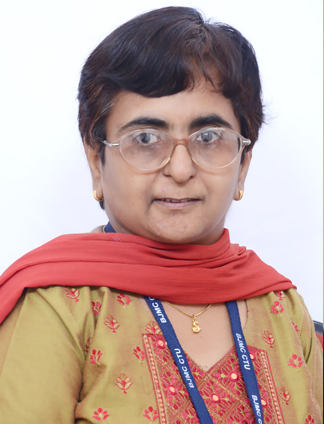Up Close: Savita Kanade
 Clinical research on the prevention and treatment of tuberculosis and HIV isn’t possible without someone like Savita Kanade, an anthropologist and Community Outreach Coordinator for the clinical research site at Byramjee Jeejeebhoy Government Medical College (BJGMC-CRS) in Pune, India. As the liaison between scientific and community stakeholders, Ms. Kanade assumes many roles to ensure that research studies are designed with community input and involve participants who are eager to participate, well informed, and engaged in clinical research and care.
Clinical research on the prevention and treatment of tuberculosis and HIV isn’t possible without someone like Savita Kanade, an anthropologist and Community Outreach Coordinator for the clinical research site at Byramjee Jeejeebhoy Government Medical College (BJGMC-CRS) in Pune, India. As the liaison between scientific and community stakeholders, Ms. Kanade assumes many roles to ensure that research studies are designed with community input and involve participants who are eager to participate, well informed, and engaged in clinical research and care.
Volunteer Recruitment
Breakthroughs in clinical research rely on recruitment of participants who volunteer to be included in the scientific process through medical therapy administration, sample collection, health and behavior monitoring, and other interventions that provide researchers with insight into how to improve disease prevention, detection, and treatment.
There are two ways that study participants are recruited for clinical trials—recruitment at the hospital while patients are seeking care, or through active outreach in collaboration with community partners. Ms. Kanade’s outreach strategies are effective, “Currently at BJGMC-CRS, participants recruited through outreach account for nearly 50% of all study participants. For some studies we get participants only from outreach.”
A major part of successful recruitment is understanding barriers to participation and retention, such as stigma of disease, discrimination, and socio-cultural issues. “Women sometimes lack decision-making power for themselves and their children. It puts us in a challenging situation when they want to be part of a study but they cannot go against the family’s decision—it could put them at risk.” Ms. Kanade explains. “Sometimes we talk to the family of the potential study participant to get their approval and support. And we have to keep in mind that potential participants might not have informed the family of their TB or HIV status.”
Participant Communications
Volunteers must consent to participate in clinical research studies, and Ms. Kanade ensures they are provided with information they need, in language they understand, about risks and benefits as well as health-related education materials, case report forms, recruitment flyers, and other patient-oriented communications. She works with clinical researchers during protocol development to review the research, process, procedures, and participant requirements for the study and translates science into lay language, and into the local languages of Marathi and Hindi.
Community Outreach
Ms. Kanade builds rapport with community members, and knows when to tread lightly, and when to press a little. She recalls an incident with an HIV infected mother working on daily wages who, despite HIV counseling, refused to have her baby tested for HIV.
“In counseling, we slowly and politely explained the importance of testing, but she would dismiss us with some reason why the baby couldn’t be tested. I decided to be direct and said, ‘What will you do if something happens suddenly to your child?’ Her reply was ‘What other option do I have besides crying?’ I asked her if she felt that she had done enough for her child, and if the answer was no, then she had no right to cry. When the woman arrived the next day to have her baby tested, it made me realize that irrespective of participant’s decision of whether to participate in a research study, outreach is an opportunity to empower patients, particularly women.” (The baby tested negative for HIV, and Kanade was able to connect the woman with services that support HIV affected families.)
Community Advisory Board Liaison
Clinical research studies require input (and ultimately, approval) from a Community Advisory Board (CAB) comprising community members who represent the diversity and interests of the local area. The CAB advises on social, ethical, religious, and cultural issues, and ensures that clinical studies are designed with the best interests of the community in mind. As representatives of the local area, CAB members also are poised to connect researchers with resources in the community.
“Clinical trials will not be successful without understanding the culture of the people, their views and perceptions of clinical trials, the challenges they face understanding the trials, and the critical issue of post-trial drug access, quality of life, and linking them to public health services after study participation is over,” Ms. Kanade explains. “CABs serve those interests.”
As liaison between researchers and the CAB, Ms. Kanade is well aware of the dedication and commitment among the people who serve, with little recognition. “Bringing the community voice and representation to the research process is critical for success; it’s unfortunate that this work is not acknowledged at the trial network level.”
